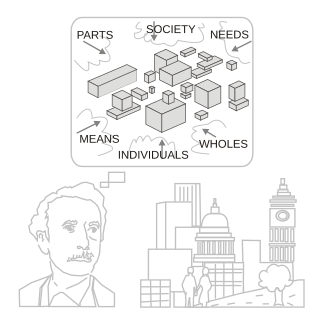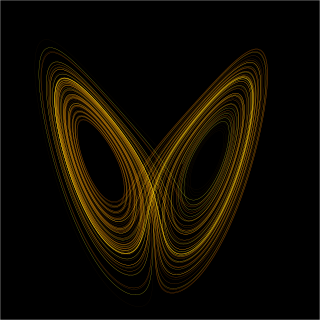Systems theory is the transdisciplinary study of systems, i.e. cohesive groups of interrelated, interdependent components that can be natural or artificial. Every system has causal boundaries, is influenced by its context, defined by its structure, function and role, and expressed through its relations with other systems. A system is "more than the sum of its parts" by expressing synergy or emergent behavior.
Fuzzy logic is a form of many-valued logic in which the truth value of variables may be any real number between 0 and 1. It is employed to handle the concept of partial truth, where the truth value may range between completely true and completely false. By contrast, in Boolean logic, the truth values of variables may only be the integer values 0 or 1.

Karl Ludwig von Bertalanffy was an Austrian biologist known as one of the founders of general systems theory (GST). This is an interdisciplinary practice that describes systems with interacting components, applicable to biology, cybernetics and other fields. Bertalanffy proposed that the classical laws of thermodynamics might be applied to closed systems, but not necessarily to "open systems" such as living things. His mathematical model of an organism's growth over time, published in 1934, is still in use today.
Computational archaeology describes computer-based analytical methods for the study of long-term human behaviour and behavioural evolution. As with other sub-disciplines that have prefixed 'computational' to their name, the term is reserved for methods that could not realistically be performed without the aid of a computer.

Lotfi Aliasker Zadeh was a mathematician, computer scientist, electrical engineer, artificial intelligence researcher, and professor of computer science at the University of California, Berkeley. Zadeh is best known for proposing fuzzy mathematics, consisting of several fuzzy-related concepts: fuzzy sets, fuzzy logic, fuzzy algorithms, fuzzy semantics, fuzzy languages, fuzzy control, fuzzy systems, fuzzy probabilities, fuzzy events, and fuzzy information. Zadeh was a founding member of the Eurasian Academy.

Systems thinking is a way of making sense of the complexity of the world by looking at it in terms of wholes and relationships rather than by splitting it down into its parts. It has been used as a way of exploring and developing effective action in complex contexts, enabling systems change. Systems thinking draws on and contributes to systems theory and the system sciences.

William Ross Ashby was an English psychiatrist and a pioneer in cybernetics, the study of the science of communications and automatic control systems in both machines and living things. His first name was not used: he was known as Ross Ashby.

Systems Science, also referred to as systems research, or, simply, systems, is a transdisciplinary field that is concerned with understanding simple and complex systems in nature and society, for which leads to the advancements of formal, natural, social, and applied attributions throughout engineering, technology and science, itself.

Dynamical systems theory is an area of mathematics used to describe the behavior of complex dynamical systems, usually by employing differential equations or difference equations. When differential equations are employed, the theory is called continuous dynamical systems. From a physical point of view, continuous dynamical systems is a generalization of classical mechanics, a generalization where the equations of motion are postulated directly and are not constrained to be Euler–Lagrange equations of a least action principle. When difference equations are employed, the theory is called discrete dynamical systems. When the time variable runs over a set that is discrete over some intervals and continuous over other intervals or is any arbitrary time-set such as a Cantor set, one gets dynamic equations on time scales. Some situations may also be modeled by mixed operators, such as differential-difference equations.
A fuzzy concept is a kind of concept of which the boundaries of application can vary considerably according to context or conditions, instead of being fixed once and for all. This means the concept is vague in some way, lacking a fixed, precise meaning, without however being unclear or meaningless altogether. It has a definite meaning, which can be made more precise only through further elaboration and specification - including a closer definition of the context in which the concept is used. The study of the characteristics of fuzzy concepts and fuzzy language is called fuzzy semantics. The inverse of a "fuzzy concept" is a "crisp concept".
Systems philosophy is a discipline aimed at constructing a new philosophy by using systems concepts. The discipline was first described by Ervin Laszlo in his 1972 book Introduction to Systems Philosophy: Toward a New Paradigm of Contemporary Thought. It has been described as the "reorientation of thought and world view ensuing from the introduction of "systems" as a new scientific paradigm".
Equifinality is the principle that in open systems a given end state can be reached by many potential means. The term and concept is due to the German Hans Driesch, the developmental biologist, later applied by the Austrian Ludwig von Bertalanffy, the founder of general systems theory, and by William T. Powers, the founder of perceptual control theory. Driesch and von Bertalanffy prefer this term, in contrast to "goal", in describing complex systems' similar or convergent behavior. Powers simply emphasised the flexibility of response, since it emphasizes that the same end state may be achieved via many different paths or trajectories.

A system is a group of interacting or interrelated elements that act according to a set of rules to form a unified whole. A system, surrounded and influenced by its environment, is described by its boundaries, structure and purpose and is expressed in its functioning. Systems are the subjects of study of systems theory and other systems sciences.
The International Federation for Systems Research(IFSR) is an international federation for global and local societies in the field of systems science. This federation is a non-profit, scientific and educational agency founded in 1980, and constituted of some thirty member organizations around the globe..

George Jiří Klir was a Czech-American computer scientist and professor of systems sciences at Binghamton University in Binghamton, New York.

Stuart Anspach Umpleby is an American cybernetician and professor in the Department of Management and Director of the Research Program in Social and Organizational Learning in the School of Business at the George Washington University.

Cybernetics is a field of systems theory that studies circular causal systems whose outputs are also inputs, such as feedback systems. It is concerned with the general principles of circular causal processes, including in ecological, technological, biological, cognitive and social systems and also in the context of practical activities such as designing, learning, and managing.
Yi Lin, also known as Jeffrey Forrest and Jeffrey Yi-Lin Forrest, is a professor of mathematics, systems science, economics, and finance at Pennsylvania State System of Higher Education (SSHE) and at several major universities in China. Lin has been an active researcher in the field of systems science since mid-1980s and serves as the founder and president of the International Institute for General Systems Studies (IIGSS).
This is an incomplete list of selected academic publications by Milan Zeleny, sorted by different disciplines and research areas.









